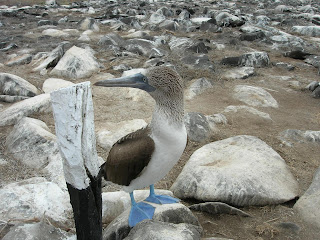 |
| Our first glimpse of the Galapagos Islands |
The Galapagos were discovered by chance in March 10, 1535
The islands are believed to date back to six million years ago as a result of volcanic activity generated beneath the ocean's floor (the islands are still in the process of being formed today). They were uninhabited, however by 1570 they appeared on maps. The first scientific mission to the Galapagos arrived in 1790 Ecuador annexed the Galapagos Islands on February 12, 1832, naming it Archipelago of Ecuador. |
| Our flight brought us to San Cristobal The Galapagos Islands are made up of some 13 volcanic islands and associated islets and rocks located in the Pacific Ocean about 620 miles west of the coast of Ecuador. The Galapagos islands are considered to be one of the most active volcanic areas in the world. They are one of the new 7 Wonders of the World. |
 |
| The landscape of the Islands are relatively barren and volcanic |
 |
| From a tourist agent in Quito we purchased a 4-day package to visit the islands. This is the "Cruise Ship" which took us from one island to the other |
 |
| Land Iguanas The moment you arrive, you'll be tripping over these creatures. They eat cactus which provides food and water. They can go without fresh water for a year. To adapt to a dry climate they conserve energy by slow movement. This makes the animals seem lazy or stupid. |
 |
| You cannot be on the Islands without a licensed guide and you MUST stay on the paths |
 |
| This becomes a problem as the animals have the right of domain (this is the path) |
 |
| These creatures are hanging over the path so they can spit on you as you pass by |
 |
| Of the 58 species of birds found in the Islands 28 of them are native--- making the Galapagos a bird lover paradise |
 |
| The masked booby is the largest of the Galapagos boobies they grow to 35 inches in length with a wingspan of 6 ft |
 |
| These Penguins are the smallest and most northerly of the warm weather penguins. They can be found only on the Galapagos Islands |
 |
| The elegant Flamingos are most often observed in shallow lagoons. The Islands boast of two species, The Chilean and The Greater |
 |
| The Albatross walk with a waddle & appear very clumsy however they are absolutely graceful in the air, Landing and taking off is comical as the birds line up like they might at LA Intl' airport, waiting for the control to give them the go-ahead. The courtship of this bird is one of a kind. |
 |
| The White Crane |
 |
| Robert's favorite, the blue-footed boobie stupidest lookin' bird you'll ever see |
 |
| There are literally birds everywhere..... The movie "The Birds" must have been filmed in the Galapagos |
 |
| The small cruise ship took us from Island to Island but we reached land in this rubber raft |
 |
| Under the sea is a world rich with tropical fish, corals, sharks, eels, rays, dolphins and more |
 |
| An usual view of Kicker Rock (in the far background) |
 |
| Santa Cruz Island and Tortuga Bay Known for the world's largest tortoises |
 |
| Check out these lovers on San Cristobal Beach |
 |
| Marine Iguanas are vegetarians and feed on seaweed. They have been known to stay underwater for over half an hour |
 |
| Their black skin turns bright red when they want to attract a mate. |
 |
| Testundinidae Tortoise You can't go to the island of Isabela without falling in love with these funny, pre-historic creatures |
 |
| They had a little parade for us it was pretty slow going |
 |
| Don't you just love this fur seal with it's nursing pup |
 |
| I've heard of swimming with the Dolfins but never talking to the Sea Lions |
 |
| These two are a new species..... They did not appear until July 29, 2005 |
 |
| They have recently been identified as Rob & Lindy Hilton |
No comments:
Post a Comment